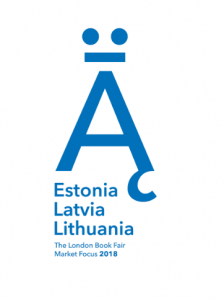It’s a good time to be a writer in Estonia, according to the author and academic Rein Raud, one of a dozen writers from the Baltic states coming to The London Book Fair in April when the region (Estonia, Latvia and Lithuania) is Market Focus. “Estonian literature has never been so diverse in terms of topics, style, manner,” he told publishers and journalists, including Sara Hunt from Saraband, on a fact-finding trip to the region organised by the British Council. “We have many women writers – our best poets are women – and the Cultural Endowment [the government-funded scheme to support writers] which offers scholarships and grants for travel, is a help. So although it’s a bad time to be anywhere in the world when it comes to politics, with mild dictatorships more popular than democracies, it’s a good time to be writer in Estonia.”
Despite his optimism, publishers remain concerned about falling print runs and say that the market in Estonia is down or at best flat. Yet publisher output remains high, with nearly 4,000 titles published in Estonian last year, an impressive figure given the size of the population (approximately 1.3m). Few print runs exceed 1,000 copies and Tauno Vahter of publisher Tanapaeu said: “If you sell 1,000 copies, it’s good. Anything above 2,000 copies is a bestseller.”
The two main chains in Estonia are experimenting with publishing their own titles – a move that is of concern to publishers who fear they will lose display space in the stores. Independents in both Estonia and Latvia are finding it tough, but in Latvia there has been an encouraging move towards small, boutique stores that perhaps mix a café and gifts with a curated selection of titles.
One of The LBF’s Authors of the Day, Mihkel Mutt, who was born in 1953, led a walking tour of old Tallinn, the capital of Estonia – very pretty in the snow with all the sound muffled and snow ploughs seemingly the only vehicles on the streets. He talked about “Soviet times”, a phrase used often by the older generation. Although he certainly doesn’t want those days to return, he notes a change in the role of writers. “People are free to write now, but to write what? Writers have become entertainers.”
Among Mutt’s many works is The Cavemen Chronicle which paints a portrait of bohemian life in Estonia in the last quarter of the twentieth century. It is published by Dalkey Archive, one of a number of indie houses that kept being mentioned throughout the trip. Others included A Midsummer Night’s Press (US), the Emma Press from Birmingham (UK), London-based Peirene, celebrating its 10th anniversary this year and publisher of Author of the Day Nora Ikstena’s Soviet Milk, Glasgow-based Vagabond Voices, Polity Books (UK and US), and the UK’s Bloodaxe, which publishes, among others, the Lithuanian scholar and poet Tomas Venclova.
In the Latvian capital, Riga, a freezing blizzard and horizontal snow, prevented a walk across the River Daugava to the fabulous National Library (and sometimes, when the ice is thick enough, people really do walk across this river, literally). The centrepiece here is a wall of books – the People’s Bookshelf – that rises to the atrium’s ceiling. In fact, this is just one bookshelf that is carried to the heavens by the clever use of mirrors.
Each of the more than 5,000 books on these shelves has been donated by a member of the public who were asked to choose a favourite title and write inside why they had chosen it. The initiative was undertaken as part of Riga’s celebrations as European City of Culture in 2014 and has now taken on a life of its own. Visiting heads of state are invited to donate titles with the Speaker of the UK House of Commons due to contribute later this year. It is an impressive affirmation of the importance of physical books to the country.
Latvian publishers are concerned about falling print runs too, but Renate Punka, the president of the Latvian Publishers Association was encouraged by the growing popularity of local Latvian authors. In a fascinating talk on the history of Latvian literature given by Anda Baklane of the National Library, Baklane noted how the concerns of novelists changed after independence in 1990. “Everything you knew before had gone. Writers turned inwards. They wanted to experiment with styles that had not been allowed, so you had magical realism and lots of work with metaphor and symbols, myths and the subconscious.”
This seems typical of the facility of writers in the region for abstract thought, something that may be a legacy of successive occupation. Certainly the region is fizzing with ideas – which bodes well for a stimulating Market Focus in April.


Roger Tagholm writes our Snapshot of the Week.

